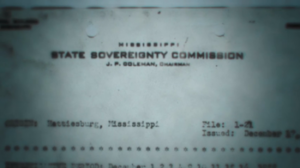
Mississippi State Sovereignty Commission (stationary)
*On this date in 1956, the Mississippi State Sovereignty Commission was created. This commission was a state agency in Mississippi, active from 1956 to 1973, tasked with fighting integration and controlling American civil rights activism.
After James P. Coleman won Mississippi's gubernatorial election in 1955, he proposed to the Legal Educational Advisory Committee the creation of "a permanent authority for maintenance of racial segregation with a full staff and funds for its operations to come out of tax money." After Coleman took office, the Mississippi House of Representatives proposed House Bill 880, which would establish a State Sovereignty Commission (also known as the MSSC or Sov-Com).
While most legislators and the local media were supportive of the bill, some representatives were skeptical of its power to give funds to private entities, fearing that the body would essentially become a partner of Citizens' Councils, civic groups organized to block desegregation. Coleman signed it into law on March 30, 1956. Governor Coleman oversaw it. The stated objective of the commission was to "protect the sovereignty of the state of Mississippi, and her sister states" from "encroachment thereon by the Federal Government." It coordinated activities to portray the state and racial segregation in a more positive light.
Serving as ex officio members of the commission were the governors and lieutenant governors of the state of Mississippi. The Sovereignty Commission spied on and conspired against civil rights activists and organized pressure and economic retaliation against those who supported the civil rights movement in Mississippi. The agency had the authority to investigate citizens of the state, issue subpoenas, and even exercise police powers, although it was not attached to any law enforcement agency. During its existence, the commission profiled more than 87,000 persons associated with, or suspected to be associated with, the civil rights movement (which it opposed).
It investigated the work and credit histories, as well as personal relations, of the persons it investigated. It collaborated with local white officials of government, police, and business to pressure Blacks to give up activism, especially by economic pressures, such as causing them to be fired, evicted from rental housing, or to have their businesses boycotted. In the 1971 state elections, Bill Waller was elected governor, and William F. Winter—a former legislator who had opposed the commission's creation—was elected lieutenant governor.
The commission was shut down on June 30, 1971. In January 1977, a bill was introduced in the Mississippi Legislature to abolish the commission and dispose of its assets. After intense debate over what to do about the agency's records, the legislature decided to have them sealed at the Mississippi Department of Archives and History until July 1, 2027.
Governor Cliff Finch signed the bill into law on March 4, 1977. The year the commission's records were sealed, the Mississippi chapter of the American Civil Liberties Union filed a class-action lawsuit against the state, arguing that the files should be released. In 1998, United States District Court Judge William H. Barbour Jr. ordered all commission records not involved in litigation to be unsealed, and most records were made available by March 17, 1998.
After subsequent court orders, the Department of Archives and History released more files on July 31, 2000, and January 18, 2001. In 2002, the department made all the commission's records accessible on its website. Once unsealed, the commission's records are available online for search. The documents also revealed the state's complicity in the murders of Chaney, Goodman, and Schwerner at Philadelphia, Mississippi. Its investigator, A. L. Hopkins, gave information about the workers to the commission, including the car license number of a new civil rights worker. It passed the information to the Sheriff of Neshoba County, who was implicated in the murders.